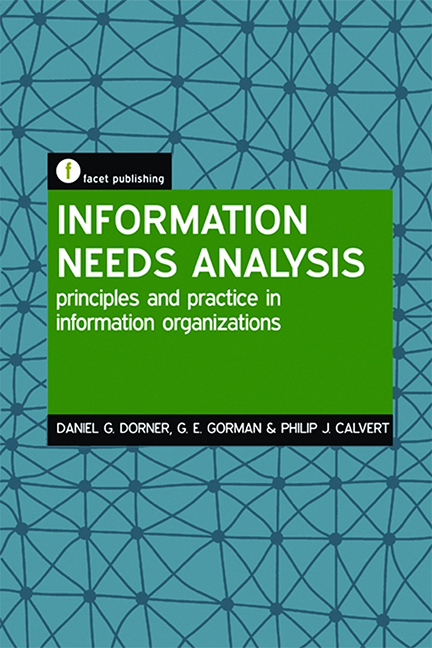Book contents
- Frontmatter
- Contents
- List of figures and tables
- List of scenarios
- About the authors
- Preface
- 1 Background to needs analysis for information managers
- 2 The importance of context in information needs analysis
- 3 Models and types of information needs analysis
- 4 The stages of information needs analysis
- 5 Gathering data for information needs analyses
- 6 Gathering data from existing sources
- 7 Gathering data through surveys
- 8 Gathering data through interviews
- 9 Analysing and integrating information needs analysis data
- 10 Reporting on an information needs analysis
- Bibliography
- Index
1 - Background to needs analysis for information managers
Published online by Cambridge University Press: 10 September 2022
- Frontmatter
- Contents
- List of figures and tables
- List of scenarios
- About the authors
- Preface
- 1 Background to needs analysis for information managers
- 2 The importance of context in information needs analysis
- 3 Models and types of information needs analysis
- 4 The stages of information needs analysis
- 5 Gathering data for information needs analyses
- 6 Gathering data from existing sources
- 7 Gathering data through surveys
- 8 Gathering data through interviews
- 9 Analysing and integrating information needs analysis data
- 10 Reporting on an information needs analysis
- Bibliography
- Index
Summary
Introduction
Needs analysis, or information needs analysis (INA), is a practice-based activity conducted mostly, but not exclusively, by an information manager, usually in relation to user and community needs. Typically, such a person, or team of people, simply roll up their sleeves and get ‘stuck in’. Perhaps there has been a flurry of e-mail exchanges with others who have done a needs analysis, and some anecdotal evidence has been gathered about how to approach this activity. Unfortunately, needs analysis is, like any research, an activity that requires careful planning, including an understanding of precisely what needs analysis is.
In this opening chapter we address a number of preliminary questions which must be understood in order to have a good grasp of INA and the INA process. Specifically,
♦ What is ‘needs analysis’ and how does it differ from ‘needs assessment’?
♦ What are ‘needs’, and what is the difference between ‘wants’ and ‘needs’?
♦ How important are value judgements in identifying needs and solutions?
♦ What are the various kinds of needs that might emerge in an information setting?
♦ How do we identify needs in an information setting?
To use this book effectively, and hence to undertake effective INA, it is necessary for readers to understand the meaning of certain key concepts. The concept of ‘need’ and the distinction between ‘need’ and ‘want’, for example, are central to this book, as is the distinction between information needs analysis and information needs assessment. How, indeed, do we define ‘need’ and ‘needs analysis’ in the context of information work? What types of INA might one undertake, and why do so in the first place? These are all questions and issues that should be addressed by anyone prior to conducting an information needs analysis.
Information needs analysis rather than information needs Assessment
At the most basic level we can view INA as an investigative process that allows us to identify and analyse the information-related needs of a particular group in a specific context and the use of that data to inform a decision. Information needs analysis includes the identification of information needs, the analysis of the needs so that they are understood and the assessment of the needs with respect to the impending decision.
- Type
- Chapter
- Information
- Information Needs AnalysisPrinciples and Practice in Information Organizations, pp. 1 - 22Publisher: FacetPrint publication year: 2017



